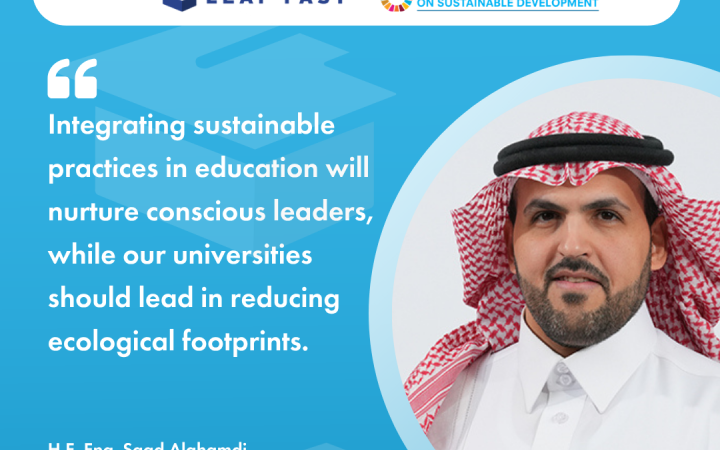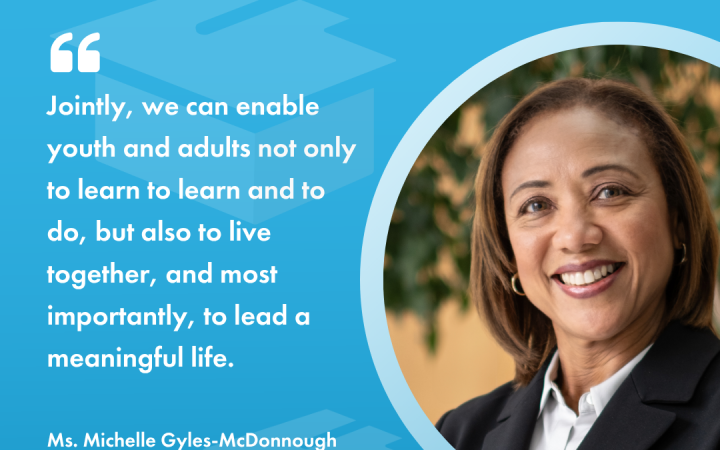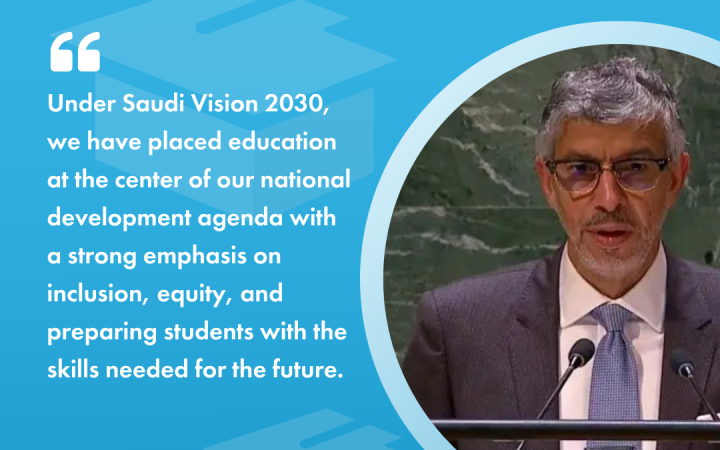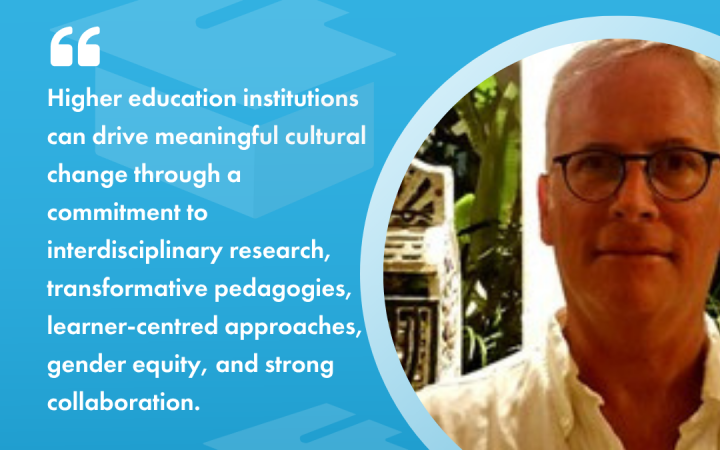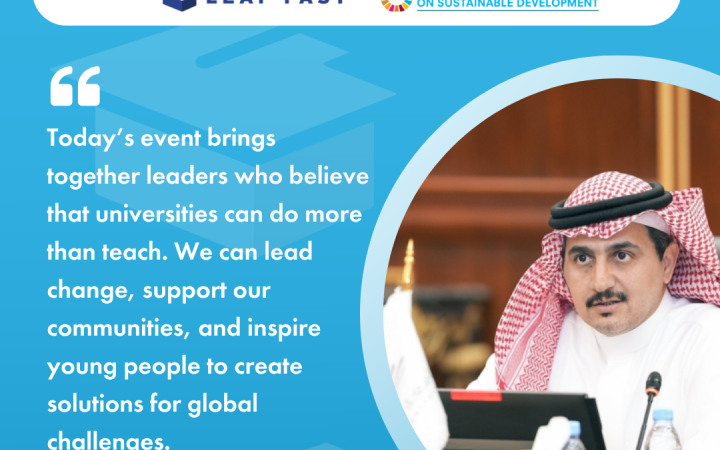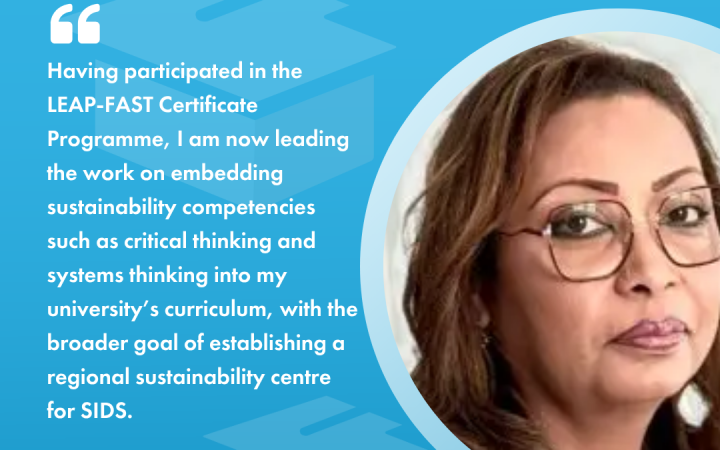28 July 2025, Geneva, Switzerland - Global leaders in higher education and sustainable development convened during a dynamic side event at the 2025 High-Level Political Forum on Sustainable Development to reaffirm higher education’s vital role in addressing the challenges of our century. Organized by UNITAR, UNESCO, and Majmaah University and CIFAL Saudi Arabia, the side event “Innovating across higher education space for more inclusive and sustainable future for all” spotlighted the momentum behind the Leaders in Higher Education Alliance Programme – For Accelerating Sustainability Transformations (LEAP-FAST), which is a global initiative uniting higher education institutions in fostering inclusive, transformative, and sustainable innovation.
Opening the event, His Excellency Engineer Saad Alghamdi, Deputy Minister of Education for Planning and Development, speaking on behalf of Saudi Arabia’s Minister of Education, underscored the ambitions of the Kingdom’s Vision 2030.
The Kingdom’s leadership has shown resolute support for the education ecosystem, recognising its vital role in achieving the ambitious goals of Vision 2030,
he stated.
His Excellency highlighted the country’s alignment with the Sustainable Development Goals (SDGs), particularly SDG 4, and pointed to the rising prominence of Saudi universities on the global stage.
Integrating sustainable practices in education will nurture conscious leaders, while our universities should lead in reducing ecological footprints
, he added.
Building on this, Ms. Michelle Gyles-McDonnough, United Nations Assistant Secretary-General and Executive Director of UNITAR, addressed the urgent need to reimagine education. She reflected on the 2022 Transforming Education Summit, noting that education systems were
no longer fit for purpose
and failing to prepare learners for a rapidly changing world.
Jointly, we can enable youth and adults not only to learn to learn and to do, but also to live together, and most importantly, to lead a meaningful life,
she said, emphasising the importance of lifelong learning. Ms. Gyles-McDonnough acknowledged with appreciation the fruitful collaboration on the LEAP-FAST initiative with UNESCO and the Kingdom of Saudi Arabia, in particular, Majmaah University for being the academic partner for the 2025 editions of the LEAP-FAST Certificate Programme. She highlighted the Programme’s focus on a cross-disciplinary, global approach to training academic leaders in sustainability transformation.
Further demonstrating Saudi Arabia’s global education leadership, Ambassador Abdulaziz Alwasil, Permanent Representative to the United Nations, praised LEAP-FAST for creating a vital platform for cross-sectoral dialogue.
We place strong emphasis on educational equity, preparing students with the skills needed for the future,
he said, reaffirming the Kingdom’s commitment to international collaboration and digital innovation in teaching and research.
Following his remarks, Mr. Christopher Castle, Director of the Division of Peace and Sustainable Development in UNESCO’s Education Sector, reinforced the importance of holistic learning.
Higher education institutions can drive meaningful cultural change through a commitment to interdisciplinary research, transformative pedagogies, learner-centred approaches, gender equity, and strong collaboration,
he stated. He emphasised that universities must serve as living laboratories for sustainability and social innovation, capable of cultivating both critical thinking and compassion.
From the academic partner’s perspective, Prof. Saleh Almezel, Rector of Majmaah University, echoed these sentiments.
This programme shows that higher education can support sustainable development and help build a better future for all,
he said. His university played a key role in hosting and supporting the initial editions of LEAP-FAST, reinforcing the importance of regional leadership in global education reform.
Today’s event brings together leaders who believe that universities can do more than teach. We can lead change, support our communities, and inspire young people to create solutions for global challenges.
he added.
Meanwhile, on-the-ground insights were shared by participating higher education institutions (of the LEAP-FAST Certificate Programme. Professor Joyce Govinden Soulange, Dean of the Faculty of Agriculture at the University of Mauritius, reflected on the initiative’s transformational impact.
Sustainability was once just a word for me,
she said candidly. Having engaged in both the training and co-creation workshop, she is now leading efforts to embed sustainability competencies such as critical thinking and systems thinking into her university’s curriculum, with ambitions to create a regional sustainability centre for Small Island Developing States.
Similarly, Attorney Angelo Jimenez, President of the University of the Philippines, reaffirmed his institution’s alignment with the 2030 Agenda.
We are committed to working toward climate action, gender equity, and strong partnerships,
he said. He praised the collaborative nature of LEAP-FAST and encouraged further collective efforts in scaling educational innovation to meet global challenges.
Prof. Orla Feely, President of University College Dublin, shared how her institution integrates sustainability within and beyond the classroom.
We offer degrees in sustainability and combine STEM with humanities to encourage interdisciplinary thinking,
she explained. The university promotes student engagement through seed funding, experiential learning, and participation in international competitions dedicated to sustainable innovation.
Expanding on the African context, Prof. Maina Mwangi, Executive Dean of the School of Agriculture and Environmental Sciences, Kenyatta University, speaking on behalf of his Vice-Chancellor, Prof. Dr. Paul K. Wainaina, highlighted the demographic urgency on the continent, with over 60% of the population projected to be under 25 by 2050. He shared how Kenyatta University is embedding sustainability into its curricula, having a UNESCO Chair, and embracing indigenous knowledge systems to foster inclusive development.
Representing the Australian perspective, Mr. Nathan Towney, Deputy Vice Chancellor for Engagement and Equity at the University of Newcastle, spoke of efforts to make higher education more inclusive.
Higher education should be a place of opportunity, not one defended by privilege,
he asserted. Mr. Towney highlighted institutional reforms that centre equity and outreach to marginalised communities as pillars of sustainability leadership.
Adding a critical and inspiring perspective, Dr. Jorge Herrera Murillo, Rector of the National University of Costa Rica, reflected on the need for higher education to serve as a driving force for social transformation.
We must integrate sustainability in all aspects of the academic mission from teaching, research, operations, to outreach,
he said. Dr. Herrera Murillo emphasised the responsibility of universities not just to produce knowledge, but to embody ethical leadership and civic commitment.
Prof. Lisa Philipps, Provost and Vice-President Academic at York University in Canada, praised the LEAP-FAST initiative for strengthening institutional capacity. She spoke of how York is embedding the SDGs across programmes, operations, and research initiatives.
We must embed the SDGs into the DNA of our institutions,
she urged, encouraging others to take bold steps in aligning academic missions with global goals.
In the series of reflections, Prof. Penny Jane Burke, UNESCO Chair in Equity, Social Justice and Higher Education, University of Newcastle, Australia, called attention to equity and epistemic justice.
We need to move beyond ‘access’ and question what kind of knowledge is being valued and who it serves,
she said. Prof. Burke urged universities to confront systemic inequalities and centre marginalised voices within the sustainability discourse.
As the session drew to a close, the sense of shared momentum was palpable. With perspectives from five continents, the event showcased how transformative, inclusive, and collaborative leadership in higher education is not only possible but essential. Through LEAP-FAST and allied efforts, educators and institutions are building a new generation of sustainability leaders equipped with the values, skills, and imagination to shape a just and resilient future. A new second edition of the LEAP-FAST Certificate Programme will be kicking off in Fall 2025.


